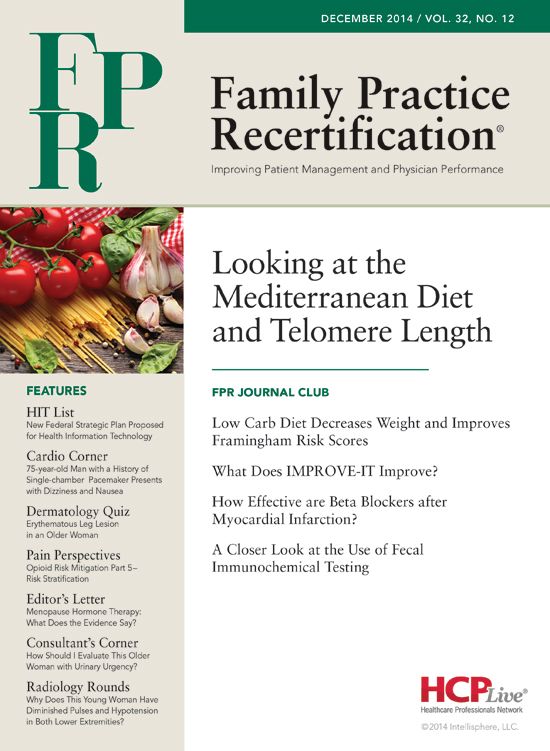Publication
Article
Family Practice Recertification
How Effective are Beta Blockers After Myocardial Infarction?
Author(s):
In the era of reperfusion, beta blockers post myocardial infarction appear to have no mortality benefit.

Frank J. Domino, MD
Review
“Questionable Benefit of Beta Blockers Following Myocardial Infarction.” The Am J Med 2014; 127 (10):939-53.
Study Methods:
A systematic review was conducted for randomized controlled trials evaluating beta blockers and acute MI. The data was divided into the pre-reperfusion era vs. the current state of reperfusion in the presence of acute MI.
Results:
Sixty trials representing over 100,000 patients met the criteria. When the data was stratified by those studies that did not include reperfusion, beta blockers reduced mortality (incident rate ratio = 0.86; ci: 0.79-0.94). In those trials that used reperfusion there was no benefit (incident rate ratio = 0.98; ci: 0.92-1.05).
In the pre-reperfusion data, beta blockers reduced cardiovascular mortality, MI, and angina, but had no difference for other outcomes. In contrast, the reperfusion data found beta blockers reduced MI (number needed to treat = 209) and angina (number needed to treat = 26), but increased the risk for heart failure (number needed to harm = 79), cardiogenic shock (number needed to harm = 90). There was a small benefit of beta blockers for preventing recurrent MI and angina in the reperfusion studies, but the benefit disappeared following 30 days.
Conclusions:
The use of beta blockers post MI in the era of reperfusion reduces the risk of MI and angina in the short term, but increases the risk of heart failure, cardiogenic shock, and provides no mortality benefit.
Commentary:
Two years ago, beta blockers lost their designation as a first line agent for hypertension. They now appear to be on the threshold of losing their indication post-MI. These data will likely have a dramatic effect on the standard of care in patients who have an acute MI.
It is curious that in the post-MI state, beta blockers increase the risk of heart failure while they continue to be the standard of care for those who already have heart failure.
This data calls for a randomized, controlled trial on the use of post-MI, post-preperfusion beta-blockade for varying lengths of time as opposed to none at all. While the clinical benefits of reducing MI in the first 30 days is appealing, this study implies it increases the risk of cardiogenic shock at 3 times the rate of recurrent MI benefit.
Counsel your patients who are post-MI that received angioplasty and stent placement about the pros and cons of beta blockade beyond 30 days of use. It may also be worth asking your cardiology colleagues for their thoughts. Doing harm is too easy with medications; providing benefit here is likely by doing less.
About the Author
Frank J. Domino, MD, is Professor and Pre-Doctoral Education Director for the Department of Family Medicine and Community Health at the University of Massachusetts Medical School in Worcester, MA. Domino is Editor-in-Chief of the 5-Minute Clinical Consult series (Lippincott Williams & Wilkins).
Additionally, he is Co-Author and Editor of the Epocrates LAB database, and author and editor to the MedPearls smartphone app. He presents nationally for the American Academy of Family Medicine and serves as the Family Physician Representative to the Harvard Medical School’s Continuing Education Committee.






